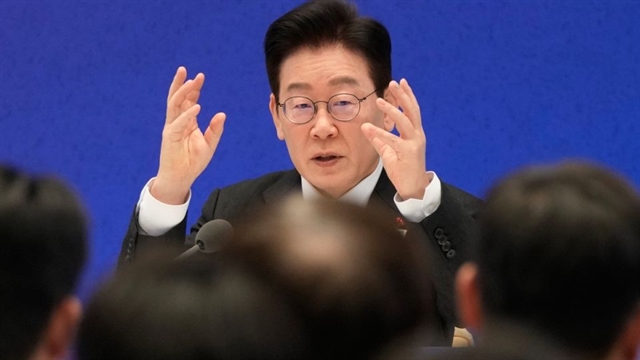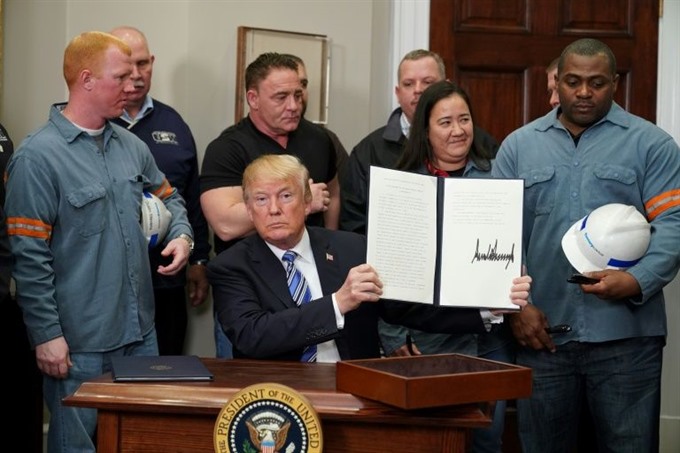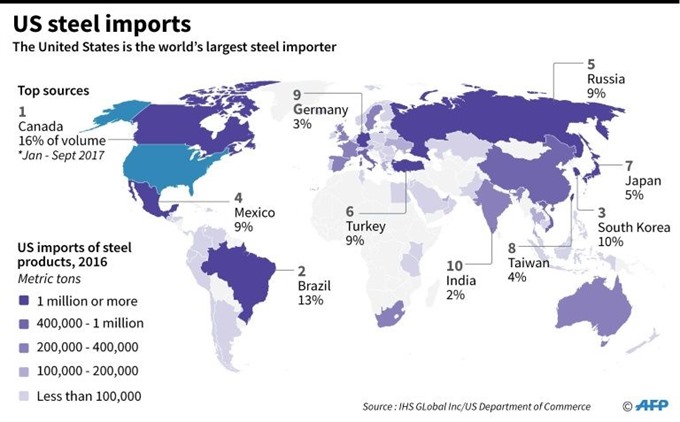 World
World

US President Donald Trump slapped steep trade tariffs on foreign steel and aluminum on Thursday, drawing sharp protests from allies at home and abroad as the contentious move raised the specter of a global trade war.
 |
| US President Donald Trump signs off on tariffs of 25 percent on imported steel and 10 percent on aluminum. — AFP/VNA Photo |
WASHINGTON — US President Donald Trump slapped steep trade tariffs on foreign steel and aluminum on Thursday, drawing sharp protests from allies at home and abroad as the contentious move raised the specter of a global trade war.
Signalling a sharp departure from a decades-long US-led drive for more open and less regulated trade, Trump declared that America had been "ravaged by aggressive foreign trade practices."
"It’s really an assault on our country," he said, in announcing the tariffs of 25 per cent on imported steel and 10 per cent on aluminum.
Trump said the tariffs -- which will come into effect after 15 days – will not initially apply to Canada and Mexico, and that close partners on security and trade could negotiate exemptions.
"Many of the countries that treat us the worst on trade and on the military are our allies, as they call them," he complained.
The tariffs, worth billions of dollars, sparked immediate protests from top trading partners the European Union and Brazil, with retaliatory action expected from China and other economic powers.
Leaning on a little-used and decades old national security clause in US trade law, Trump said he was fulfilling a campaign promise.
"I’ve been talking about this a long time, a lot longer than my political career," he said. "We’ve been treated very badly by our past administrations, by presidents that represented us that didn’t know what they were doing."
The mercurial 45th president compared his action to those of predecessors George Washington, Abraham Lincoln and William McKinley.
’Real friends’
Canada, America’s neighbour to the north, was its single-largest source of steel last year, followed by Brazil, South Korea, Russia, Mexico, Japan and Germany.
Regarding alumina and aluminum, Canada was also by far the largest supplier followed by China, Russia and the United Arab Emirates.
Trump had indicated he would be flexible toward "real friends", and during the signing confirmed Canada and Mexico would be permanently exempted if the ongoing renegotiation of the North American Free Trade Agreement is successful.
The US leader had also added Australia to a list of likely carve-outs, as a "great country" and "long term partner".
But he singled out Germany for criticism, reviving a longstanding gripe that European NATO allies do not pay their fair share.
"We have some friends and some enemies where we have been tremendously taken advantage of over the years on trade and on military," he said.
The EU’s top trade official Cecilia Malmstroem insisted the entire bloc "should be excluded" from the tariffs as a "close ally," vowing to "seek more clarity" from Washington.
Britain, meanwhile, said it would "work with EU partners to consider the scope for exemptions outlined today," saying "tariffs are not the right way" to tackle the problem of global over-capacity in steel.
Major producer Brazil immediately vowed to take "all necessary steps" in order to "protect its rights and interests" in response to the US move.
China on Friday denounced US tariffs on aluminium and steel imports, saying that they would profoundly harm the international trade environment.
The US’s "abuse" of national security concerns as a reason for implementing the measures will lead to "a serious attack on normal international trade order", the Ministry of Commerce said in a statement on its web site, adding that "China is firmly opposed".
Japan, the sixth biggest exporter of steel to the US, also hit out.
"The measure could have a grave impact on the economic relationship of Japan and the US... and also on the global economy," said Foreign Minister Taro Kono, describing the move as "regrettable".
Both Mexico and Canada, meanwhile, rejected Trump’s linkage of the levies to ongoing NAFTA talks.
Canada’s foreign affairs minister termed the two things "separate issues" while Mexico’s Economy Ministry said, "the negotiation of the NAFTA should not be subject to conditions outside the process." — AFP
 |
| AFP/VNA Photo |




